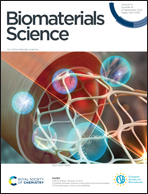Mitigating RANKL-induced cholesterol overload in macrophages with β-cyclodextrin-threaded polyrotaxanes suppresses osteoclastogenesis†
Abstract
Free cholesterol acts as an endogenous agonist for estrogen-related receptor α (ERRα), a nuclear receptor that regulates osteoclastogenesis. Because stimulation of macrophages with receptor activator of nuclear factor κB ligand (RANKL) induces an overload of free cholesterol and activates ERRα, we hypothesized that direct removal of cellular cholesterol would suppress osteoclastogenesis. In this study, the effect of 2-hydroxypropyl β-cyclodextrin (HP-β-CD), a highly water-soluble cyclic glucopyranose, and β-CD-threaded polyrotaxanes (PRXs), supramolecular polymers designed to release threaded β-CDs in acidic lysosomes, on RANKL-induced cholesterol overload and osteoclast differentiation of murine macrophage-like RAW264.7 cells were investigated. PRXs suppressed RANKL-induced cholesterol overload. Additionally, RANKL-induced osteoclast differentiation of RAW264.7 cells was inhibited by PRXs. In contrast, HP-β-CD did not reduce cholesterol levels or inhibit osteoclast differentiation in RAW264.7 cells. Gene expression analysis of osteoclast markers suggested that PRXs suppress only the early stage of osteoclast differentiation, as PRXs cannot be internalized into multinucleated osteoclasts. However, modification of PRXs with cell-penetrating peptides facilitated their cellular uptake into multinucleated osteoclasts and inhibited osteoclast maturation. Thus, PRXs are promising candidates for inhibiting osteoclast differentiation by suppressing cholesterol overload and may be useful for treating osteoporosis or other bone defects caused by the overactivity of osteoclasts.



 Please wait while we load your content...
Please wait while we load your content...